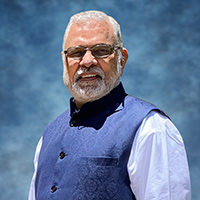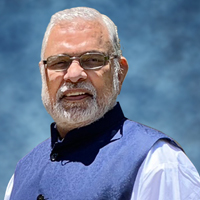Editorial August 2025
Dear Readers, 
Why I’m Losing Faith in Trump
As someone who voted for Donald Trump three times, I believed I was supporting a bold leader who would put America first, shake up the status quo, and bring long-overdue clarity and strength to U.S. foreign policy. I appreciated his tough stance on China, his willingness to confront global hypocrisy, and his pro-business, pro-America rhetoric. But what we are witnessing now is a troubling evolution—a pattern of erratic, short-term decisions driven more by personal ego and impulse than by long-term national interest.
Despite my initial support for Trump, I have the honesty and conviction to point out his mistakes. That is more than I can say for some of my friends who harbor such strong animosity towards Trump that they are unable to recognize any of his accomplishments. They won’t acknowledge his successes with the economy or the Abraham Accords, just as they blindly overlook how President Biden and then-candidate Kamala Harris hurt our country with divisive rhetoric, inconsistent energy policy, and weak international leadership.
Let’s return to Trump. Let’s talk about where things are going seriously off track—and how that is relevant for the future of U.S. credibility and prosperity.
The India Dilemma: Tariffs and Oil Hypocrisy
One of the most baffling recent developments is Trump’s newly proposed 25% tariff on Indian imports, combined with threats of economic penalties if India continues to buy oil from Russia. This is astonishing—not only because India is one of America’s most important strategic partners in the Indo-Pacific, but also because it reveals a profound misunderstanding of India’s national interests.
India’s Prime Minister, Narendra Modi, has made it clear that India will purchase energy from any source that offers the best deal. That includes discounted Russian oil. And Modi has not backed down under pressure—neither from the Biden administration nor from Trump’s recent remarks. Such behavior isn’t anti-Americanism. It’s simply smart policy. Like any world leader, Modi is doing what’s best for his people, especially during a time of inflation and energy volatility.
Trump’s strategy, which employs tariffs and economic threats as blunt tools of foreign policy, may garner immediate attention, but it undermines enduring alliances. America should not bully India, nor should she punish it. It’s the world’s largest democracy, a rising economic power, and a natural counterweight to China. Alienating India is not just poor diplomacy—it’s strategically foolish.
And the irony doesn’t stop there. While threatening India over Russian oil, Trump recently made a bizarre announcement about wanting to drill for oil in Pakistan, a country that has little proven oil reserves and is not even a realistic candidate for such an operation. It’s unclear whether the statement was a misunderstanding, a publicity stunt, or just another example of Trump speaking without facts—but it left both diplomats and energy experts scratching their heads.
Pakistan: From Critic to Cheerleader
This is the same Trump who once criticized Pakistan for harboring terrorists and demanded accountability. He even praised Imran Khan, the former prime minister of Pakistan, and called for his release when he was jailed by the military regime. But today, he appears to be cozying up to the very Pakistani generals who orchestrated Khan’s imprisonment—specifically General Asim Munir.
General Munir, known as the force behind Khan’s ouster and suppression of democratic voices, is now being treated with diplomatic favor. Even General Michael Kurilla, head of U.S. Central Command (CENTCOM), recently called Pakistan a “phenomenal partner in the counter-terrorism world,” even though terrorists continue to be discovered within its borders.
What happened to principles? What happened to standing with democratic leaders and opposing military regimes? This about-face is not strategy—it’s inconsistency that weakens U.S. credibility abroad.
Trump vs. Elon Musk: A Fight That Helps No One
Then there’s the self-inflicted feud with Elon Musk. What began as a policy disagreement—Musk questioning the tax implications of Trump’s proposals—devolved into a personal insult contest. Trump attacked Musk’s business acumen, questioned his loyalty, and mocked him on social media.
Let’s be honest: Elon Musk, for all his eccentricities, is one of the most important innovators of our time. He’s building the future of transportation, space travel, and artificial intelligence. Picking a fight with him just because he voiced criticism is not a sign of leadership, but rather of ego-driven immaturity. And it sends the wrong message to every entrepreneur and visionary who might otherwise align with conservative economic values.
Israel and Ukraine: Love-Hate, Hot-Cold Diplomacy
Trump’s tense relationship with Israeli Prime Minister Benjamin Netanyahu raises additional concerns. As president, Trump was one of the most pro-Israel leaders in American history—moving the U.S. Embassy to Jerusalem, recognizing the Golan Heights, and brokering the historic Abraham Accords. These were landmark moves.
Yet after Netanyahu congratulated Joe Biden on his 2020 win, Trump’s tone shifted dramatically. He lashed out at Netanyahu in interviews, calling him disloyal and using profane language. Why? Netanyahu failed to put Trump’s personal emotions ahead of diplomatic etiquette. That kind of response is not leadership—it’s emotional politics.
Similarly, Trump’s stance on Ukraine has been murky and inconsistent. While he once tried to pressure Ukrainian President Volodymyr Zelenskyy for political favors, more recently he has criticized U.S. aid to Ukraine altogether, claiming the war is “not our fight.”
Let’s be clear: supporting Ukraine is not about endless foreign wars. It’s about deterring authoritarian expansion, maintaining the global order, and showing our allies that we stand by them. Abandoning Ukraine, or using it as a pawn in political games, is shortsighted and emboldens aggressors like Putin.
Tariffs as a Foreign Policy Tool: Short-Term Win, Long-Term Loss
Trump is increasingly relying on tariffs as a default foreign policy tool—not just on India, but on China, Europe, and beyond. This may generate short-term pressure, but most economists and geopolitical experts agree: it creates instability, drives up costs for American consumers, and often fails to achieve the desired political outcomes.
As multiple foreign policy experts and economists (yes, even conservative ones) have said, tariffs are not a substitute for diplomacy. Tariffs ought to serve as a supplementary tool, not a primary weapon. And when used indiscriminately, they damage relationships that took decades to build.
Honesty Over Loyalty
As a Trump voter, I still believe he had some great policies. He shook the global establishment, he was fearless on immigration and trade, and he brought attention to issues the media tried to ignore. But I’m also willing to call him out when he’s wrong. That’s called honesty. That’s called being a bigger man.
Too many people today treat politics like a sport. If you’re on Team Trump, he can do no wrong. If you align yourself with Team Biden, you believe that Trump embodies pure evil. I decline to engage in such discourse. I have friends who hate Trump so much they won’t admit he had any beneficial ideas. And those same people blindly supported Kamala Harris and Joe Biden, ignoring their countless missteps.
But America doesn’t need more blind loyalty. It needs clarity, courage, and consistency.
America Deserves Better
 I voted for Trump because I believed in the promise of a strong, sovereign, America-first future. But what I see now is a man whose decisions are increasingly erratic, short-term, and self-serving. His shifting stances on Pakistan, India, Israel, Ukraine, and his fights with private citizens like Elon Musk show a leader more concerned with ego than enduring principle.
I voted for Trump because I believed in the promise of a strong, sovereign, America-first future. But what I see now is a man whose decisions are increasingly erratic, short-term, and self-serving. His shifting stances on Pakistan, India, Israel, Ukraine, and his fights with private citizens like Elon Musk show a leader more concerned with ego than enduring principle.
America deserves better than emotional foreign policy. We need vision, discipline, and partners who trust our word. And that starts with holding all our leaders—past, present, and future—accountable.
Raj Shah
Managing Editor

















